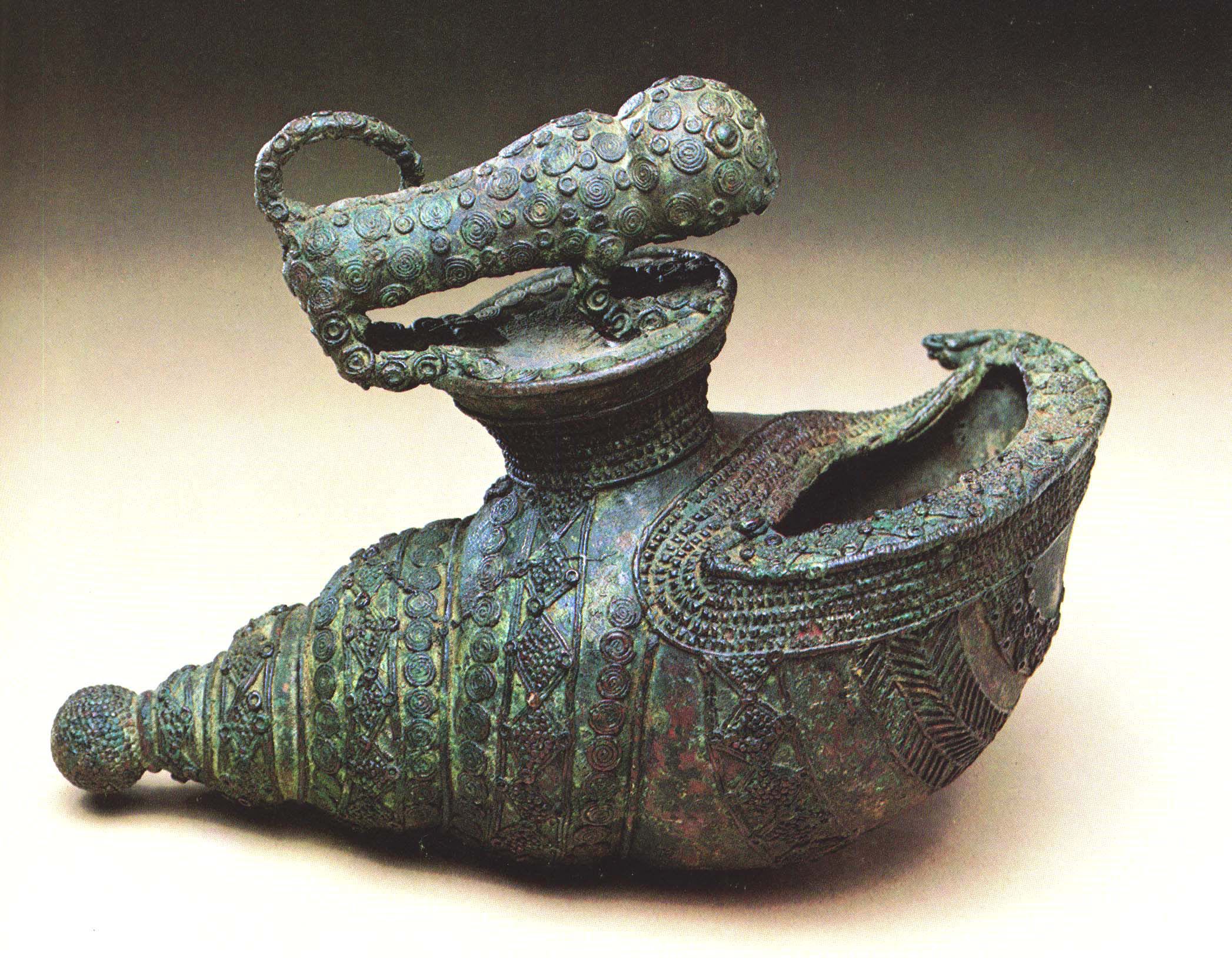In 1938 a Nigerian farmer called Isiah Anozie unearthed dozens of intricate objects made of cast bronze, while digging a cistern on his property. It was later discovered that his family farm sat on top of an ancient ceremonial center that was home to a society which existed over a millennium before.
Isiah’s discovery initiated one of the most significant archaeological finds in the history of Nigeria and ultimately changed the way in which scholars understand the timeline of art and trade in west Africa. Over the next two decades, hundreds more bronze objects were discovered, along with thousands of glass beads, numerous pieces of ceremonial pottery, as well as the remains of elite burial. These archaeological sites were evidence of an advanced and wealthy society that flourished in the lower Niger region of modern-day Nigeria during the ninth to the eleventh centuries C.E.
The remains were named after the village in which they were discovered – Igbo-Ukwu, the ancient culture of Igbo-Ukwu, which means “Great Igbo,” left behind a rich record of visual art with impeccable craftsmanship and complex symbolism. It is possible that the ancient culture of Igbo-Ukwu represents the ancestral legacy of the Igbo people, one of Nigeria’s largest ethnic groups.
In 1959 British and Nigerian government officials negotiated the first professional archaeological excavation of the site that was uncovered by Isiah Anozie. British archaeologist Thurston Shawspent five years in Nigeria overseeing the excavation. Ultimately, Shaw uncovered three sites on the Anozie family property, and he named them after the Anozie brothers – “Igbo Isiah,” “Igbo Richard” and “Igbo Jonah.”
Each site offered clues to the ancient society of Igbo-Ukwu. In Igbo Isiah, Shaw found a repository of elaborate cast bronze objects that included ceremonial vessels, pot stands, jewelry and various ornamental regalia. Igbo Richard contained evidence of an elite burial for an individual of great political, religious or social status. Accompanying the human remains in Igbo Richard, Shaw found over 100,000 glass beads, preserved textiles, elephant tusks and cast bronze regalia. In Igbo Jonah, which appeared to serve the purpose of a disposal pit – there were several ceramic shards, additional bronze objects and more glass beads. These discoveries confirm that the people of Igbo-Ukwu had considerable material wealth and likely participated in significant trade.
The bronzes from Igbo-Ukwu have garnered much attention from scholars due to intricate designs and symbolism, as well as the technical know-how required to create them. Many of the bronze objects uncovered were skeuomorphic, including the vases and ropes. Over 165,000 glass and carnelian beads were found at Igbo-Ukwu, as were objects of copper, bronze and iron, broken and complete pottery and burnt animal bones. Most of the beads were made of monochrome glass of yellow, greyish blue, dark blue, dark green, peacock blue and reddish-brown colors. There were also striped beads and multi-colored eye beads, as well as stone beads and a few polished and dull quartz beads. Some of the beads and brasses include the portrayal of elephants, coiled snakes, large felines and rams with curved horns.
To date, no bead-making workshops have been found at Igbo-Ukwu and for decades the array and variety of glass beads found there has been a source of great debate. If there is no workshop, where did the beads come from? Scholars suggested trade connections with Indian, Egyptian, the near eastern, Islamic and Venetian bead makers. This also fueled another debate about what kind of trade network Igbo-Ukwu was a part of. Using radiocarbon, Shaw concluded that the bronzes, beads, pottery and burial were from the nineth and eleventh century C.E. Although some scholars have questioned Shaw’s conclusions, arguing for a somewhat later date in the 15th century C.E., nonetheless it is the earlier dates that are widely accepted today.
According to Alica Apley, an independent scholar who has studied a lot of the literature around the art as well as some of the art itself, “It is possible that the inhabitants of Igbo-Ukwu had a metal-working art that flourished as early as the nineth century. The people of Igbo-Ukwu, ancestors of present-day Igbo, were the earliest smithers of copper and its alloys in west Africa, working the metal through hammering, bending, twisting and incising. They are likely among the earliest groups of west Africans to employ the lost-wax castingtechniques in the production of sculptures. Oddly however, evidence suggests that their metal working repertoire was limited and Igbo smiths were not familiar with techniques such as raising, soldering, riveting and wire-making, although these were used elsewhere on the continent.”
One of the biggest questions that remains about the culture of ancient Igbo-Ukwu is in what ways it was connected to other cultures and societies, within Africa and beyond. The talent of the castors was truly exceptional, the Igbo-Ukwu bronzes have been compared to the finest jewelry of rococoEurope or designs by Carl Faberge. The high technical proficiency and lack of known prototypes of the Igbo-Ukwu bronzes led to initial speculation that they must have been created after European contact and phantom voyages were postulated. However, research and isotope analysishas established that the source of the metals is of local origin. Some of the artifacts discovered were deposited with the Nigerian government, while some are housed in the British museum’s collection, most of the bronzes can be seen in five places in Nigeria – the Nigerian museum in Jos National Museum, the Nigerian National Museum in Lagos, the Nigerian museum in Kaduna, the University of Ibadan Cultural Heritage Museum and the Museum of Mankind in London.
Leave a Comment
Sign in or become a Africa Rebirth member to join the conversation.
Just enter your email below to get a log in link.


Related News
How Ancient Mombasa Became the Gateway of African Commerce
May 31, 2025
Poro and Sande: The Secret Societies of West Africa
Apr 30, 2025
What can we Learn from Great African Warriors?
Jul 20, 2023